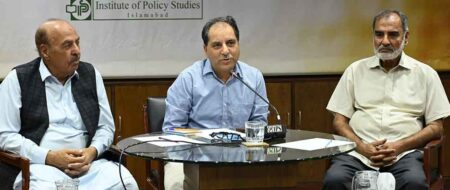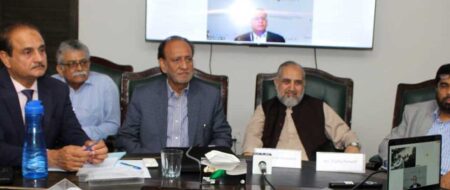Manipulation of Fiscal Data Destroying Country’s Economic Statistics
Manipulation of fiscal data destroying country’s economic statistics
Senior economists at a pre-budget seminar held at Institute of Policy Studies (IPS) on Thursday, 19 May 2016, came heavy on what they called “the manipulation of fiscal data” on part of both the government and the International Monetary Fund (IMF), which was destroying the country’s economic statistics.
They demanded of the government that the budget for the coming fiscal year 2016-17 should be based on long-term economic priorities of the nation, with human development and wellbeing as the main focus. Mere balancing of payments was by no means the objective of economic planning and policy making. The budget entails the overall policy direction and should not be taken merely as a sheet-balancing or accounting exercise.
The keynote speaker, Dr Ashfaque Hasan Khan, dean, School of Social Sciences & Humanities, National University of Science & Technology (NUST) and former economic advisor to the federal government alleged that the IMF has turned a blind eye on the economic failures of the present government.
The event was chaired by Fasih Uddin, former chief economist, Planning Commission of Pakistan and was also addressed by Masud Daher, former federal secretary. Both are also members of IPS-National Academic Council.
Heavily criticizing the macroeconomic policies of the government, especially its austerity measures and spending priorities, Dr Khan claimed that the country will be faced with a deadly debt trap by 2018-19 as a result of the measures taken by the financial managers of the present regime. Had the international oil prices not gone down since June 2014, the government would have had added at least eight billion dollars debt on the country by now, he added.
He was of the view that the actual GDP growth falls hardly in the vicinity of three per cent to 3.7 per cent contrary to the government’s claims to heading towards a growth rate of around six per cent, which according to him were based on distorted facts and manipulated data.
Dr Khan also projected that actual fiscal deficit would amount to over eight per cent of the GDP and the government’s economic managers were tarrying to arrive at facts agreed – after several revisions – with the IMF by playing with the actual economic indicators. He added that a mammoth amount of Rs178 billion was being accounted for as “statistical discrepancy.” He also calculated the average growth in Large Scale Manufacturing (LSM_ and agriculture at 3.2 per cent and 2.8 per cent respectively, during past three years of economic management by the present regime. “Agriculture growth will remain stagnant this year,” he forecasted.
He said that the revenue targets were being met at FBR only by delaying refunds to the industry and exporters. Around two million youth of the prime age of 20-24 years were out of job market. Fifty million bales of cotton were destroyed only last year and loss of one million bales represents the loss of half per cent GDP. Out of Rs700 billion development budget only Rs466 billion has been spent so far and the provinces were being deprived of their social sector budget by delaying tactics and incentivizing non-utilization of funds.
“When all economic indicators are negative how can there be economic stability as being claimed politically by the government”, and “when both the government and private sectors are not spending, how can the economy grow?” he asked. “Moral authority of the leadership has been dented,” he deplored.
“We have damaged growth because of priorities of expenditure were wrong, he lamented. “These are anti-growth, anti-job creation and anti-people policies,” he opined.
The speakers, however, also hailed the strength and economic robustness of the Pakistani nation, which has continued to thrive due to its rural and informal economy and also the billions of dollars of remittances sent by expatriates.
Fasih Uddin, in his concluding remarks, while noting that the economic performance in the outgoing fiscal year has been better than the performance of the last year, said that there was a “gap between what we had realized and what we may actually have realized considering the potential of the economy.”
He was of the view that as this was the last full-fiscal budget by the present team of economic managers, they should focus more on the wellbeing of the common man as the time before seeking a new mandate was coming closer.












